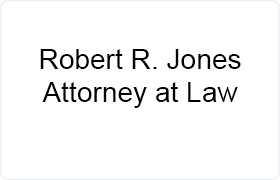 Brazoria County, TX RICO Act Lawyers
Brazoria County, TX RICO Act Lawyers
Sponsored Law Firm
-
 x
x

Click For More Info:
-
Robert R. Jones Attorney at Law
3526 E. FM 528 Suite 204 Friendswood, TX 77546» view mapCriminal Defense Expert Representation for Reasonable Rates
If you need representation, call me 24/7.
800-883-8760
Not enough matches for Brazoria RICO Act lawyer.
Below are all Brazoria lawyers.
Sponsored Lawyers
1-10 of 63 matches
Accident & Injury, Criminal, Personal Injury, Car Accident, DUI-DWI
Whether you have been the victim of a Houston traffic accident, or you are dealing with an important business law matter, or you have been arrested for driving while intoxicated or other criminal offense, we at the Kahn Law Firm understand what you are going through. The legal process is often overwhelming, and you may feel as if you have nowhere to turn for help. Fortunately, the Kahn Law Firm is here to assist you every step of the way. In addition to worrying about where to turn for help, victims often face financial difficulties following a personal injury. Similarly, clients facing a Texas DWI charge are justifiably concerned about the substantial consequences that they face if convicted. Business law clients may feel overwhelmed by the highly complex nature of these matters. Using over two decades of combined experience and knowledge, our husband and wife legal team will advocate for a fair settlement and fight for you in the courtroom. We have recovered millions of dollars for our clients, and will pursue the compensation that you need and deserve to help improve your life. During this time of significant emotional, physical, and financial strain, you can count on our team of Houston attorneys to give your matter the attention that it deserves. We treat each case as if it is the only case that we are handling, because we understand that it is the only case that matters to you.
(more)Divorce & Family Law, Criminal, Wills & Probate, Mediation, Juvenile Law
A native of Angleton, Texas in Brazoria County, Jeff Gilbert is a 6th generation Texan with deep roots to his community. Graduating from Angleton High School in 1978, Mr. Gilbert attended Baylor University in Waco, Texas where he was involved in the leadership of many campus service and social organizations. Upon completion of his business degree (BBA) in 1982, Mr. Gilbert returned to Brazoria County going to work for the First Freeport National Bank in Freeport, Texas. Mr. Gilbert later returned to Baylor where he enrolled in the graduate school of business obtaining his degree (MBA) while working as the night manager of the Baylor Student Union. Upon graduation, Mr. Gilbert began a career in banking and corporate investments before entering South Texas College of Law at the age of 27. While in law school, Jeff participated in many intramural moot court and mock trial competitions. Interestingly and of note, Jeff tried and won his first jury trial while in law school serving as an intern with the Harris County District Attorney's office before receiving his J.D. from South Texas College of Law in December 1989. Mr. Gilbert then accepted a position in the Trial Bureau of the Harris County District Attorney's office in Houston, Texas where he tried multiple jury and non-jury cases as a juvenile, misdemeanor and then felony prosecutor. In 1993, Mr. Gilbert left the District Attorney's office to join a prestigious Houston based civil litigation firm. Since that time, his practice has concentrated on litigation, including medical malpractice, pharmaceutical and toxic tort litigation with firms in Houston, Angleton and Dallas, Texas. In January 2006, Mr. Gilbert began a Brazoria County based practice and formed Jeffrey R. Gilbert, P.C. Mr. Gilbert is a member of The State Bar of Texas (Section Memberships include: Criminal Law, Family Law, Juvenile Law), The Brazoria County Bar Association (Past President 2008-2009), The Houston Bar Association, and is a Fellow of the Houston Bar Foundation. He is also a member of the Texas Criminal Defense Lawyers Association, The College of the State Bar of Texas and is a Fellow of the Trial Advocacy Institute of the Fireman's Fund Insurance Company. He is admitted to practice before all courts of the State of Texas and the United States District Court for the Southern District of Texas. Mr. Gilbert remains a Trial Attorney. His practice focuses on criminal, family and general litigation. Mr. Gilbert was honored to serve two terms (1996 through 1998) as a special judge of the Harris County Criminal Courts at Law. This appointment was made by the 15 county criminal court at law judges of Harris County. Mr. Gilbert presided over hundreds of case dispositions and numerous trials in this position. Active in his community, Mr. Gilbert currently serves on the City of Lake Jackson Planning Commission, as a Board Member and Preseident-elect of the Brazosport Symphony Orchestra Council, as a three-term President of the Brazoswood Buccaneer Band Booster Club (2008-2009, 2009-2010, 2010-2011), he is a past president and former board member of the Downtown Houston Pachyderm Club, and has been a delegate to every Senate District (1996 and 1998, SD #7; 2000, SD #8; and 2002, 2004 , 2006 and 2008, and 2010, SD #17) and State Republican convention since 1996. Mr. Gilbert and his family are proud to trace their Texas roots to John Bradbury Follett who settled in Texas on Follett Island near San Luis Pass in Brazoria County. Accordingly, Mr. Gilbert is a proud member of the Stephen F. Austin Chapter of the Sons of the Republic of Texas. Mr. Gilbert attends BrazosPointe Fellowship in Lake Jackson, where he serves as an usher, greeter, has previously led an adult "Home Team" and has been active in its children's ministries. Mr. Gilbert is the father of two children: Will, a student at Texas A&M University and Morgan, a student at Brazoswood High School. Mr. Gilbert is the son of the late Ralph W. Gilbert, a long-time Angleton attorney, and Fannie Mae Follett Gilbert a life-long resident of Brazoria County. Special Training and experience - Trained Mediator - AA White Dispute Resolution Institute; University of Houston Law Center; Certified for Approval of Court-Ordered Mediations; Trained Family Law Mediator Travis County Dispute Resolution Center; Credentialed and Qualified Family Law Mediator; Trained Ad Litem - Harris County Civil Court Ad Litem Training Course, 1998, 2005; Trained Guardianship Attorney Ad Litem - Completed Training Required by Texas Probate Code for service as Attorney Ad Litem in State Courts Areas of Practice Mediation Business & Commercial Law Contracts Business Organizations Sexual Harassment Construction Law Criminal Law DUI/DWI Guardianships & Conservatorships Wills Family Law Adoption Custody & Visitation Divorce Litigation & Appeals Personal Injury -- Plaintiff Motor Vehicle Accidents -- Plaintiff Probate & Estate Administration Products Liability Law Medical Malpractice Real Estate Law
(more)Accident & Injury, Criminal, Traffic, DUI-DWI, Slip & Fall Accident
John J. Kahn, Jr. practices in the areas of Personal Injury and Criminal Law. As a personal injury lawyer, Mr. Kahn has handled a variety of personal injury cases including automobile/truck accidents, industrial/offshore/railroad accidents, daycare injury cases, wrongful death cases, toxic torts, prescription drug cases, products liability cases, birth injuries, and premises liability cases. As a criminal defense attorney in Pearland and the Houston area, Mr. Kahn deals with all Felonies and Misdemeanors for both adults and juveniles including DWI, drug crimes, sex crimes, assaults, thefts, burglary, and probation violations. Mr. Kahn graduated from Loyola University in New Orleans, LA and then attended South Texas College of Law where he graduated with his juris doctorate in 2001. That same year, he was admitted to practice law in Texas. Mr. Kahn is a member of the Houston Trial Lawyers Association, Harris County Criminal Lawyers Association, National College for DUI Defense, the Texas Trial Lawyers Association, and the Christian Trial Lawyers Association.
(more)Divorce & Family Law, Estate, Adoption, Divorce, Child Support
Robert D. Clements, Jr. is a firm courtroom presence—aggressive when necessary but always aware that people’s lives are in the balance. His goal is to provide the same counsel and same protection to each client that he would give when representing a close friend or family member. Understanding that—even when a litigant’s choice is painful—bad counsel and bad decision-making can seriously exacerbate their losses. Though the United States courtroom is unequaled in the world, it can inflict devastating injury if not handled properly. Robert graduated from the Creighton University College of Law, Cum Laude, in 1981. His last year of law school he attended Southern Methodist University. After six years with an extremely successful Plaintiff’s law firm and three years with Britt, Todd, Hagood & Clements, he founded the Law Office of Robert D. Clements, Jr., in 1989. Though he has handled cases all over the State of Texas, he works primarily in Brazoria, Harris, Galveston, Fort Bend and Montgomery county. Mr. Clements has gained a reputation for skillfully handling difficult and hotly contested litigation where the stakes are high—financially or emotionally. He has represented estates and businesses worth millions of dollars, families in crisis, injured workers and drivers, and homeowners against their insurance company. Mr. Clements is double board certified.
(more)Accident & Injury
Patrick B. Larkin, is the Founder and President of The Larkin Law Firm. After graduating from Texas A &M University in 1994 with a Bachelor’s of Science in Economics, Mr. Larkin attended South Texas College of Law in Houston, Texas. Mr. Larkin graduated with a Doctorate of Jurisprudence in 1999 and began his legal career in Houston, Texas. Mr. Larkin spent more than 10 years practicing law in downtown Houston, focusing primarily on civil litigation and business law. Mr. Larkin founded The Larkin Law Firm in 2009 to assist individuals and business owners. Mr. Larkin was named as one of Houston’s Top Lawyers by H Texas Magazine in 2014. Mr. Larkin is currently licensed to practice law in the State of Texas, and admitted to practice law in the Western, Eastern, Northern, and Southern United States District Courts. Mr. Larkin is also a proud Pearland area resident. He has lived in the Pearland area since 2002. When he is not advocating for his clients, Mr. Larkin is an avid sports fan and enjoys attending Aggie sporting events. Mr. Larkin is also actively involved in the Pearland Chamber of Commerce, where he has served as Chairman of the Board.
(more)


 Robert Jones Friendswood, TX
Robert Jones Friendswood, TX AboutRobert R. Jones Attorney at Law
AboutRobert R. Jones Attorney at Law Practice AreasSpecializations
Practice AreasSpecializations





